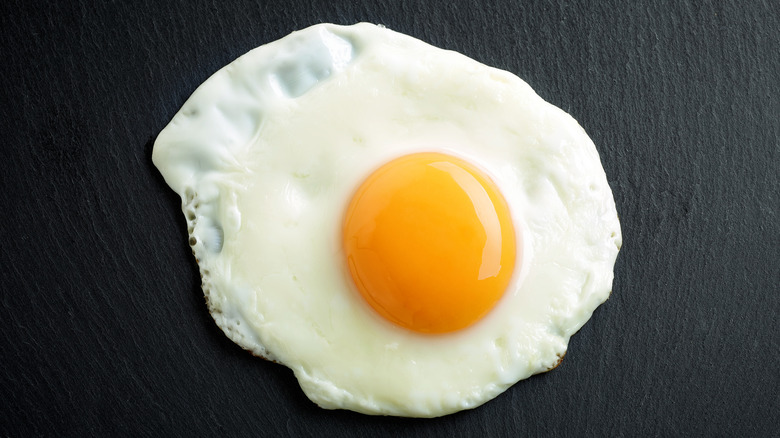Make Cooking Brunch Easier Than Ever By Water-Basting Your Fried Eggs
As simple as frying an egg seems, there is an art to perfecting the texture and appearance. Now, if you're frying an egg for breakfast, you might do it haphazardly, browning the edges or leaving it overcooked. But when it comes to brunch, your eggs must be Instagram-worthy. After all, that is what separates an average breakfast from a weekend brunch. Brunch is a sprawling table spread of gorgeous over-easy eggs, crispy baguettes, Belgian waffles, berries, and cream, while breakfast tends to be a more private ordeal (overnight oats, anyone?).
With all the frying, slicing, and tempering that goes into preparing a solid brunch, you don't want to worry about the eggs. One overcooked, rubbery fried egg can ruin an entire dish. Even a perfect side of home fries won't suffice — the burnt egg will forever taint the plate, along with your planned Instagram story. So how do we prevent this from happening? Water-basting. You may have heard of butter basting, a popular method for cooking steaks at home, where you spoon melted butter over your steak. Well, the same can be done to eggs, except all you use is water.
Water-basting makes a perfect egg
We've all been there: We decide we want an egg cooked sunny-side up, but somehow end up with gelatinous, runny whites on the top. While this may seem like no big deal if you're a fan of raw egg whites, most prefer perfectly set egg whites that complement the oozing yolk. If you're familiar with steaming, water-basting is a very similar concept that involves cooking the top of the fried egg by splashing hot water on it. It's basically a method of rehydrating whatever you're cooking using liquids or fats (via USDA).
While butter-basting your fried egg gets you deep-brown, crispy edges, water-basting makes your over-easy eggs picture perfect. MasterClass explains that all you have to do is fry your eggs in a lightly oiled pan over medium heat. Then, you add a splash of water to the pan, which you continually spoon over the top of your egg. The added water sets the top of your egg without overcooking it, and it even adds moisture to the egg, which tends to become rubbery once heat is involved, per the Exploratorium. If poaching eggs for your eggs benedict seems too scary an ordeal, water-basting can produce a flawlessly set egg with a runny yolk. Perhaps it sounds unconventional, but this "fried egg" has all of the elements of a perfectly poached egg with way less hassle and room for error. So try this hack the next time you have friends over for brunch; it'll surely impress a crowd.

